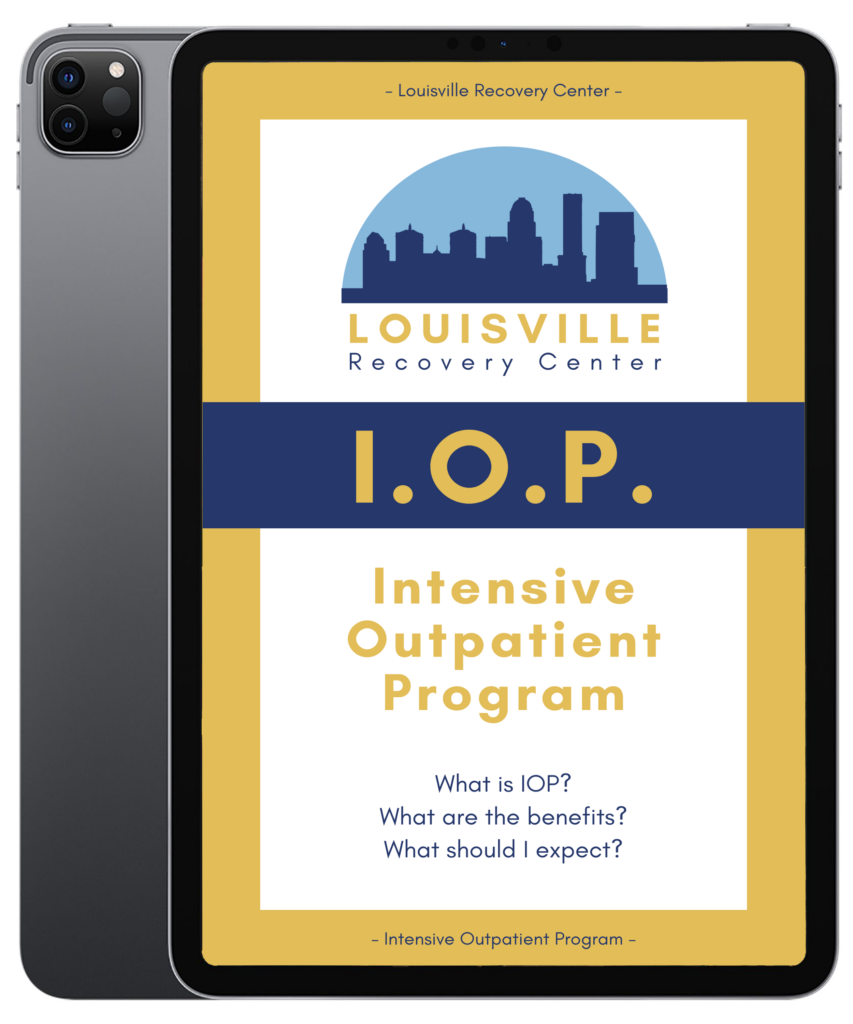Alcohol Rehab Program in Louisville
at Louisville Recovery Center
Since alcoholism is the most common addiction throughout the world, it is important to know that alcohol rehab in Louisville is available. According to the National Institute on Alcohol Abuse and Alcoholism, 14.5 million Americans had Alcohol Use Disorder (AUD) in 2019 alone. Alcoholics in recovery are constantly bombarded with triggers because of alcohol’s prevalence throughout our culture. In order to be effective, Louisville Recovery Center provides clients with effective and individualized treatments and therapies to ensure the best chance at long-term sobriety.
Alcohol Rehab at Louisville Recovery Center
It is possible to overcome alcohol addiction and start a new life after receiving the appropriate treatment. At Louisville Recovery Center, we offer inpatient and outpatient treatment for alcohol addiction that focuses on providing individualized care for the whole person. When choosing the right program for you or your loved one, you should be aware of all the choices. We provide a variety of AUD treatment programs at different levels of intensity if you or a loved one need help.
Partial Hospitalization Program (PHP) – An PHP is a 24-hour, full-time treatment program that offers a variety of services after a successful withdrawal. This intensive treatment option is used to treat addiction-related social and behavioral issues in order to help people maintain sobriety. Our Partial Hospitalization Program consists of comprehensive therapeutic processes and is based on a modified 12-step approach that incorporates various holistic therapies and exercises. Upon completion of this program, you will be encouraged to transition to an outpatient treatment program. Participating in this next phase of treatment is crucial in decreasing your risk of relapse.
Intensive Outpatient Program (IOP) – Those who live at home, in a sober living environment, or in another conducive environment for maintained sobriety may participate in the Intensive Outpatient Program. This is a low-intensity, part-time daily program offered to those who are receiving treatment for their alcohol addiction. While in the program, clients will attend scheduled individual and group therapy sessions and be encouraged to participate in support groups. This outpatient treatment option is suitable for those seeking treatment for their AUD while also looking to return to work, school, or family life. It is particularly beneficial for those who have finished a comprehensive treatment program such as an inpatient or PHP program and still want clinical support in their everyday lives.
Aftercare – Individuals who have finished some type of drug or alcohol rehabilitation treatment can benefit from aftercare. Whether you’ve finished a stay at a rehabilitation facility, a partial hospitalization program, or one of our specific treatment tracks, you can always benefit from aftercare. Patients who desire to remain involved with a recovery community after treatment at Louisville Recovery Center can continue to receive the services they received throughout treatment. Dual diagnosis treatment, medication management, and group therapy are just a few of the options available.

Fill Out This Quick Form To Download Our FREE IOP eBook
Therapies Offered At Louisville Recovery
Behavioral therapies, which are frequently applied to treat AUDs, are provided in both inpatient and outpatient settings. These therapies include, but are not limited to, the following:
Psychotherapy
Addiction-related mental health and emotional problems can be treated using psychotherapy. When an addict is in active use, he or she often develops harmful symptoms. By eliminating these symptoms, psychotherapy may greatly improve the well-being of those who receive it.
Psychotherapy is commonly used to help addicts overcome mental health disorders, but some seek treatment for day-to-day issues. It is conceivable that you can benefit from a form of psychotherapy, even if you do not have a mental health condition, regardless of what issue you are facing.
Mindfulness-Based Therapy
Addiction recovery using a mindfulness approach focuses on treating the entire individual, not just the substance abuse. Reductions in anxiety, stress reactivity, distraction, and depression, all of which may impede recovery, are among the many health advantages of mindfulness. Self-compassion, concentration, cognition, heart and immune system health, rest, resilience, connection, and feeling of belonging are just a few of the outcomes of mindfulness-based therapy that have been clinically demonstrated.
Adventure Therapy
There are many types of adventure therapy, but in general, it is a process in which fun activities and group outings are used to help patients by providing real-world support. Adventure and experiential therapy, among other things, offer the chance to develop self-confidence, communication, and social skills, as well as teamwork, self-reflection, and more.
Equine Therapy
The method of using horses in therapeutic sessions is known as equine-assisted therapy (EAT). The horses are handled by qualified professionals to ensure client safety during these therapeutic sessions. There are a variety of activities that can be carried out with the horses, such as haltering, leading, and grooming them.
The horses may assist a client to develop skills such as emotional regulation, self-confidence, and responsibility, among others. As a result of its experiential nature and some emerging evidence of its competence, this approach has become increasingly popular in therapy sessions because of its massive size.
What is Alcohol Use Disorder?
Alcohol Use Disorder, or alcoholism, is a condition described as the inability to cease alcohol use despite the many negative effects it has on all areas of your life. Having AUD is not a moral failing or a sign of weakness; rather, it is a chronic brain illness that may develop without treatment if left untreated. There are various factors that affect whether an individual develops an AUD—some instances are influenced genetically, while others are triggered by environmental exposure like trauma.
14.1 million Americans suffer from AUD, and it can affect anyone. Even mild alcoholism can cause problems, depending on the number of symptoms the person has. According to the latest research, AUD can cause long-term changes in the brain. Some drinkers may not have AUD, but their drinking patterns put them at risk for it as well as other problems.
Signs of Alcoholism
When you or a loved one is suspected of having an alcohol use disorder, it is natural to feel concerned about the condition. In this article, we will discuss the physical and mental signs of AUD in order to address some of your concerns. Here are some symptoms to keep in mind if you suspect someone has an AUD.
● The need to drink increasingly larger amounts of alcohol
● Failure to stop drinking
● Neglecting responsibilities
● Isolation
● No longer feel fulfillment from activities once enjoyed
● Financial trouble
● Legal issues
● Change in appearance such as weight gain, pale skin, red eyes
● Failure to meet work or family obligations
Withdrawal symptoms can occur several hours to a few days after drinking is stopped or reduced in regular or heavy drinkers. Withdrawal symptoms stemming from alcohol use disorder can include:
■ Increased heart rate
■ Muscle spasms
■ Hand tremors or “shakes”
■ Insomnia
■ Nausea and vomiting
■ Anxiety
■ Hallucinations
■ Irritability
■ Seizures
Dangers of Leaving Alcoholism Untreated
Untreated alcoholism can cause liver and brain damage, pancreatitis, and a weakened immune system, among other health problems.
Permanent brain damage
In addition to affecting cognitive functioning, alcohol also alters moods and emotions. Balance and fine motor coordination are both disturbed, increasing the chance of injury. Alcoholism can also lead to permanent, early dementia if left untreated.
Liver damage
Long-term liver damage is one of the most serious consequences of alcohol abuse, resulting in alcoholic hepatitis. Cirrhosis, which occurs when alcoholic hepatitis damages the liver, adversely affects about 40% of those with the condition. Multiple organ failure and death may result from cirrhosis.
Pancreatitis
Alcoholic pancreatitis is an injury to the pancreas that is usually caused by years of alcohol abuse and results in painful pancreatic inflammation. Severe cases of alcoholism, such as those resulting from untreated alcoholism, may result in life-threatening complications and require hospitalization. Mild cases of alcoholic pancreatitis may not require treatment.
Weak immune system
When someone drinks heavily, white blood cells get stuck in the spleen and the white blood cell count drops. This results in a compromised immune system and decreased resistance to infection.
You Can Trust Louisville Recovery Center
If you or someone you know is struggling with alcoholism and could benefit from receiving professional addiction treatment, contact the specialists at Louisville Recovery Center today. Our qualified specialists are here to answer any questions you may have and help you take your first step towards an alcohol-free life.
